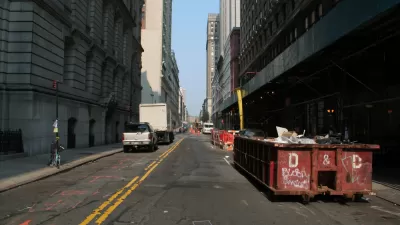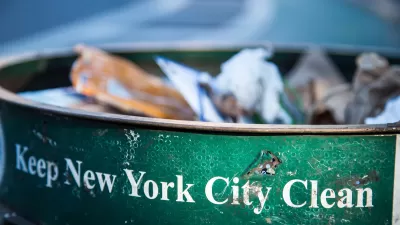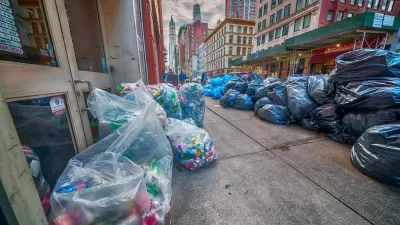Sanitation workers must manually collect bags from containers blocked by parked cars, slowing a process that is meant to be safer and more efficient.

Despite a recent program to containerize garbage, New York City sanitation workers still have to contend with parked cars blocking trash containers, forcing them to continue manually collecting garbage bags from the city’s sidewalks.
As Kevin Duggan explains in Streetsblog NYC, “The agency is equipping some of its roughly 2,000 rear-loaders with tippers to mechanically hoist the newly mandated wheelie bins, but because they're on the sidewalk, these upgrades will run up against the steel wall of the roughly 3 million parking spaces the city provides to motorists largely at no cost.”
The city’s new containerization program is part of the effort to reduce the rampant rat population. Next year, the Sanitation Department will begin installing street-side stationary containers for buildings with 31 or more units, while smaller buildings can choose stationary containers or mobile bins.
In addition to keeping the city’s streets cleaner, containerization can also reduce the physical impact on sanitation workers, who haul “as much as 20 tons per shift in some neighborhoods.” According to Duggan, “The answer to this issue is clawing back space from cars for better uses, advocates said, urging Sanitation officials to work with the Department of Transportation to mark sections of the streetscape to wheel out trash.”
FULL STORY: Cars Still Get in the Way of Containerized Trash Pickup

Alabama: Trump Terminates Settlements for Black Communities Harmed By Raw Sewage
Trump deemed the landmark civil rights agreement “illegal DEI and environmental justice policy.”

Planetizen Federal Action Tracker
A weekly monitor of how Trump’s orders and actions are impacting planners and planning in America.

Why Should We Subsidize Public Transportation?
Many public transit agencies face financial stress due to rising costs, declining fare revenue, and declining subsidies. Transit advocates must provide a strong business case for increasing public transit funding.

Understanding Road Diets
An explainer from Momentum highlights the advantages of reducing vehicle lanes in favor of more bike, transit, and pedestrian infrastructure.

New California Law Regulates Warehouse Pollution
A new law tightens building and emissions regulations for large distribution warehouses to mitigate air pollution and traffic in surrounding communities.

Phoenix Announces Opening Date for Light Rail Extension
The South Central extension will connect South Phoenix to downtown and other major hubs starting on June 7.
Urban Design for Planners 1: Software Tools
This six-course series explores essential urban design concepts using open source software and equips planners with the tools they need to participate fully in the urban design process.
Planning for Universal Design
Learn the tools for implementing Universal Design in planning regulations.
Caltrans
Smith Gee Studio
Institute for Housing and Urban Development Studies (IHS)
City of Grandview
Harvard GSD Executive Education
Toledo-Lucas County Plan Commissions
Salt Lake City
NYU Wagner Graduate School of Public Service





























